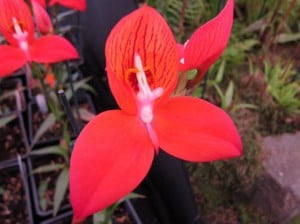
I’m always on the prowl for exotic looking plants and the ones that caught my eye this year at the Hampton Court Flower Show were the ‘Disa’ orchids from Dave Parkinson plants.
Dave used to grow salad crops commercially but then turned his love of these orchids into a business. They come in pink, yellow and coral and orange colours, with petals that are have a striking intensity. Disas are not difficult to grow, but like carnivorous plants, you have to know what their requirements are (both fairly similar as it turns out…).
Disa orchids mostly come from South Africa. They tend to live on the edges of streams, so they are used to having wet feet at all times. This doesn’t mean they like stagnant water, so when growing them at home, leave them in a saucer of water which is changed every few days. Disas do require peat to grow well (although most gardeners have moved away using this for general purpose gardening, some specialised plants like these do require it). It’s also a good idea to mix some perlite in to the potting mix to help with aeration – around half and half with peat.
Like other orchids, never firm the soil down when you pot them on says Dave, just give the pot a tap on the table when you’ve repotted to make sure the peat has settled.
‘One of the biggest reasons people kill them is that they over-feed them’ says Dave. He recommends a very small amount of fertiliser in spring to help the plant put on growth (seaweed fertilizer is perfect), then a little in the autumn when re-potting to help fill out their food storage bulbs. Eventually the middle section of the disa dies down leaving new young plants around the edge, these are the ones that should be potted on. When watering, water the pot and let the water run through advises Dave, but feed the plants by putting the feed in the tray, not on the plant. It is vital to use rain water and not hard water as the salts will kill the plant.
If you have a cool greenhouse to grow disa orchids in, so much the better. Although they can go out for the summer they are not completely frost hardy and benefit from the protection of glass in winter.
For ordering disa orchids or for more information go to www.daveparkinsonplants.co.uk










